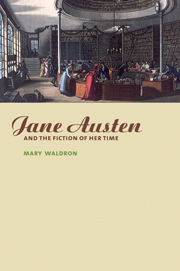Book contents
- Frontmatter
- Contents
- Acknowledgements
- Texts and abbreviations
- Introduction
- 1 The juvenilia, the early unfinished novels and Northanger Abbey
- 2 The non-heiresses: The Watsons and Pride and Prejudice
- 3 Sense and the single girl
- 4 The frailties of Fanny
- 5 Men of sense and silly wives – the confusions of Mr Knightley
- 6 Rationality and rebellion: Persuasion and the model girl
- 7 Sanditon – conclusion
- Notes
- Bibliography
- Index
5 - Men of sense and silly wives – the confusions of Mr Knightley
Published online by Cambridge University Press: 22 September 2009
- Frontmatter
- Contents
- Acknowledgements
- Texts and abbreviations
- Introduction
- 1 The juvenilia, the early unfinished novels and Northanger Abbey
- 2 The non-heiresses: The Watsons and Pride and Prejudice
- 3 Sense and the single girl
- 4 The frailties of Fanny
- 5 Men of sense and silly wives – the confusions of Mr Knightley
- 6 Rationality and rebellion: Persuasion and the model girl
- 7 Sanditon – conclusion
- Notes
- Bibliography
- Index
Summary
The ‘Opinions of Mansfield Park’ which Jane Austen collected and preserved gave her evidence that, though some readers were aware of the dispersal of the focus of reader approval present in the novel – they were doubtful about which characters they ought to ‘like’, and were honest about saying so – others tended to remodel the content to suit their expectations, and missed the novel's subtleties and built-in uncertainties. Lady Robert Kerr, for instance, commented on ‘the pure morality with which it abounds’ making it ‘a most desirable as well as useful work’; ‘Mr. Egerton the Publisher praised it for it's Morality’ (MW 433). Adverse criticism often centred on the short-comings of a character the commentator clearly thought intended to be virtuous by the author; Fanny Knight objected to Edmund's attraction to Mary Crawford and his failure to face up to Henry Crawford's iniquities (MW 431); Mary Cooke, a cousin, thought ‘Fanny ought to have been more determined on overcoming her own feelings, when she saw Edmund's attachment to Miss Crawford’ (MW 432–3), showing herself securely attached to the Fanny Burney/Maria Edgeworth stereotype. Austen could be excused for feeling especially frustrated by the last comment, for a reading unbiassed by expectations of moral ‘usefulness’ clearly reveals that the plot dynamics absolutely require Fanny to fail in this way.
- Type
- Chapter
- Information
- Jane Austen and the Fiction of her Time , pp. 112 - 134Publisher: Cambridge University PressPrint publication year: 1999



